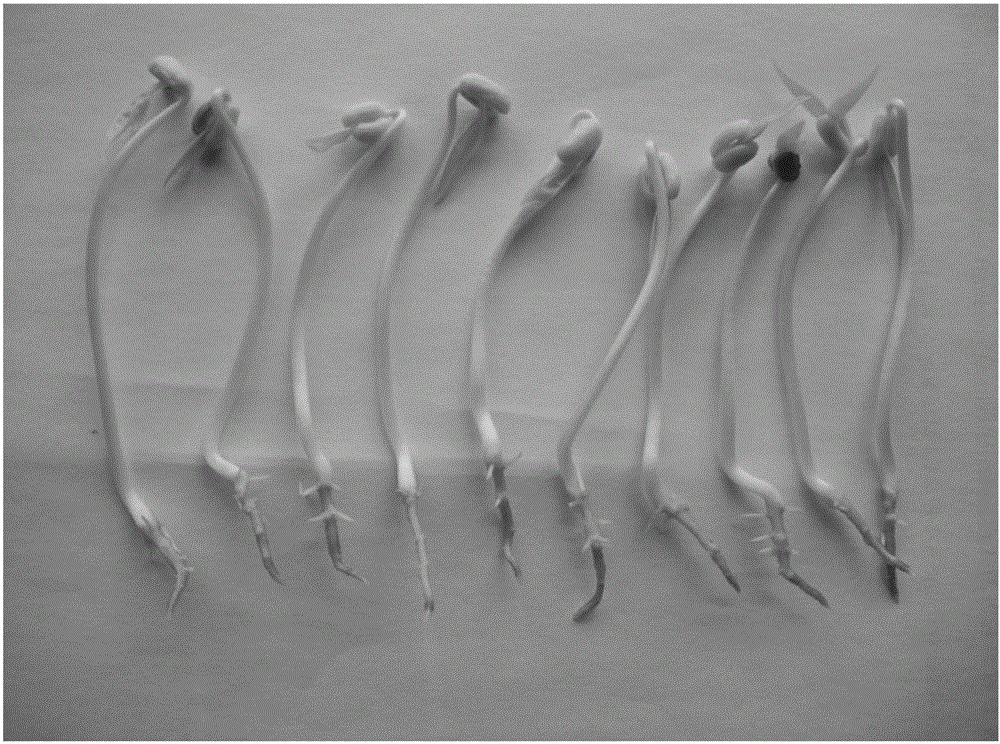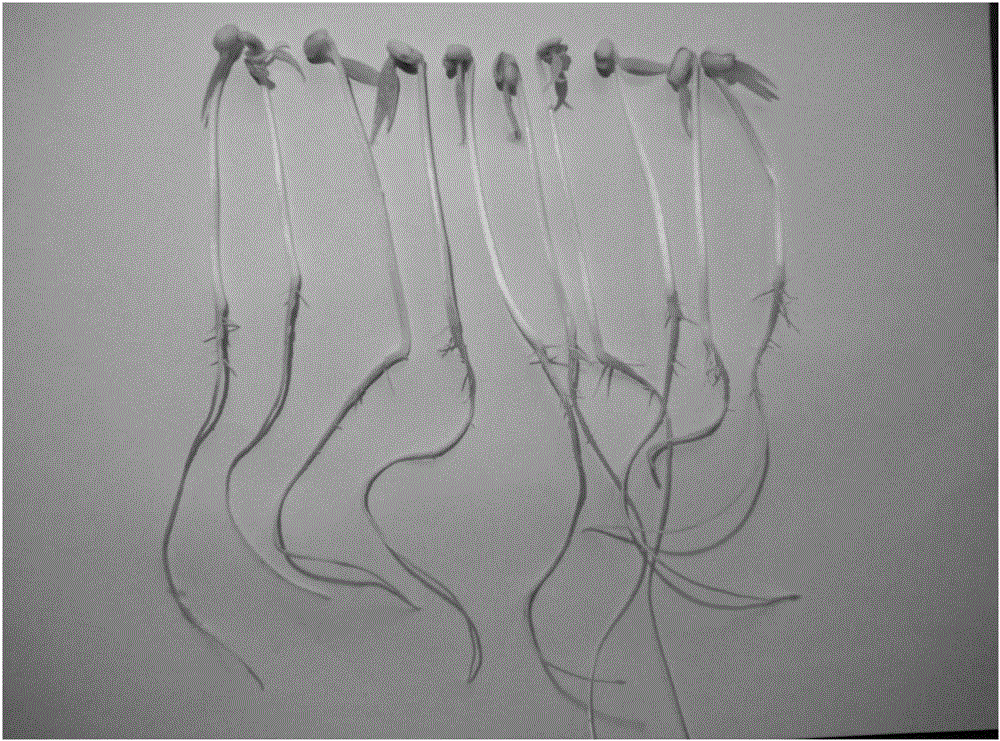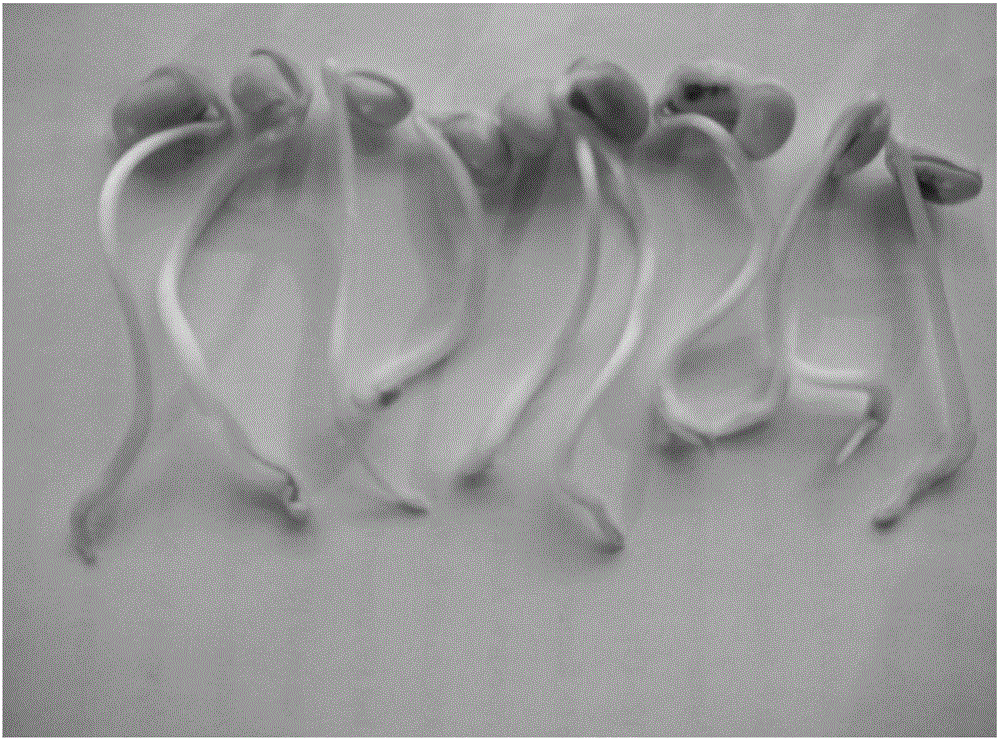2-(4-methoxyphenyl) propionic acid and application of salt compound thereof same in growth of rootless sprouts
A salt compound, the technology of methoxyphenyl, applied in the application field of 2-propionic acid and its derivatives, can solve the problems of bean sprouts production reduction, bean sprouts production loss, soybean perishability, etc., and achieve good suppression of sprouts and vegetable roots Effects of growth activity, improvement of germination rate, and acceleration of germination time
- Summary
- Abstract
- Description
- Claims
- Application Information
AI Technical Summary
Problems solved by technology
Method used
Image
Examples
Embodiment 1
[0017] Embodiment 1 cultivates rootless mung bean sprouts
[0018] Take an appropriate amount of mung beans, soak the mung beans for 12 hours, accelerate germination, and after the whitening, transfer the germinated mung beans to Rongshida DY-15G bean sprout machine for cultivation, and the culture solution is 8ppm 2-(4-methoxyphenoxy ) propionic acid aqueous solution, the cultivation temperature is about 28 ℃, and the rootless mung bean sprouts can be obtained after 2 days of cultivation.
[0019] The cultivation of normal mung bean sprouts in the control group was the same as above, except that the culture solution did not contain 2-(4-methoxyphenoxy)propionic acid.
[0020] Each group randomly took 10 bean sprouts, and measured the root length, stem length, root weight, and stem weight respectively.
[0021] Other concentration treatment cultivation methods are the same as above.
[0022] The experimental results are shown in Table 1 below.
[0023] Table 12-(4-methoxyph...
Embodiment 2
[0027] Embodiment 2 cultivates and produces rootless soybean sprouts
[0028] Take an appropriate amount of soybeans, soak the soybeans for 12 hours, accelerate germination, and after the whitening, transfer the germinated soybeans to Rongshida DY-15G bean sprout machine for cultivation, and the culture medium is 6ppm of 2-(4-methoxyphenoxy ) sodium propionate aqueous solution, the cultivation temperature is about 28 DEG C, and the rootless soybean sprouts can be obtained after 2 days of cultivation.
[0029] The cultivation of normal soybean sprouts in the control group was the same as above, except that the culture solution did not contain 2-(4-methoxyphenoxy)sodium propionate.
[0030] Other concentration treatment cultivation methods are the same as above.
[0031] The experimental results are shown in Table 2 below.
[0032] Table 22-(4-Methoxyphenoxy) Sodium Propionate Cultivated Soybean Test Results
[0033]
[0034] As can be seen from Table 1, the rootless soybe...
Embodiment 3
[0036] Embodiment 3 cultivating agent is to experiment of accelerating germination of soybean
[0037] Randomly select 40 plump and undamaged soybeans, soak them in 10mL of water and 2-(4-methoxyphenoxy)sodium propionate with a concentration of 1, 5, 10, and 15ppm for 12 hours, so that the liquid is completely covered by the soybeans. Absorb, then cover the soybeans with a wrung out damp cloth. Run the soybeans through cool water every 8 hours and keep the cloth damp. Count soybean germination at regular intervals. The test results are shown in Table 3.
[0038] Table 32-(4-methoxyphenoxy) sodium propionate test results for soybean germination
[0039]
[0040] As can be seen from the experimental results in Table 3, blank water was processed, and in 12 hours, the germination rate had only 10%, and also only had 37.5% after 28 hours, and with 10ppm2-(4-methoxyphenoxy) sodium propionate, 12 hours Immediately after reaching 40% germination rate, soybean germination is adv...
PUM
 Login to View More
Login to View More Abstract
Description
Claims
Application Information
 Login to View More
Login to View More - R&D
- Intellectual Property
- Life Sciences
- Materials
- Tech Scout
- Unparalleled Data Quality
- Higher Quality Content
- 60% Fewer Hallucinations
Browse by: Latest US Patents, China's latest patents, Technical Efficacy Thesaurus, Application Domain, Technology Topic, Popular Technical Reports.
© 2025 PatSnap. All rights reserved.Legal|Privacy policy|Modern Slavery Act Transparency Statement|Sitemap|About US| Contact US: help@patsnap.com



